How OceanTee are making golf more sustainable
Published:
OceanTee continues its drive to reduce every golfer’s impact on the environment.
OceanTee first came to Today’s Golfer’s attention in 2020 when we met with founder Ed Sandison.
His ambition was to change the way that the industry and golfers think about the way we use plastic and our impact on the environment. This was, and still is, an incredibly inspiring brand ethos, but what is most impressive about this relatively new company isn’t just its unique product range, but the effect that it’s already having on golf around the world.
“I want OceanTee to become the No.1 sustainably-focused golf brand. The whole business is based around performance, sustainability, being bold and transparent,” Sandison told us.
RELATED: Best Black Friday Golf Deals

OceanTee’s Clothing
For Autumn-Winter 2021, OceanTee has put together a collection of high-quality, sustainable products that are good for your game and great for the planet.
You may not realise it, but the reason why this is so important is that most traditional golf clothing is manufactured using nylon, polyester, or elastane, all of which are made from virgin plastic! In fact, the fashion industry is the second-largest polluter in the world behind fossil fuel energy.
By identifying, pioneering and promoting sustainable fabrics that perform just as well, if not better, than ‘traditional’ materials, OceanTee is turning the tide.
RELATED: Best Golf Polo Shirts
“Every product we create has a different sustainable story,” says Sandison. “We’re working with a not-for-profit group called the Sustainable angle, who are experts in materials – they put new materials in front of people who want them; fabrics made from 100% ginger, blends of cotton and seaweed… there are so many things out there you can use.
“The idea behind our brand is that we’ll showcase these cutting-edge materials and fabrics and introduce them to golf. There’s so much we could do.
“One of the benefits of being small is that I can do things incredibly quickly – that’s the bold, disruptive bit. If a new fabric comes out, I want to be able to use it – I don’t want to wait for a new product line. The scope is absolutely massive. but we must keep that transparency.”

OCEANTEE REEF POLO
RRP £84.99-£89.99 | Sizes S-XXL
This is a premium polo for men and women made from a fabric unique to OceanTee. The Merino wool and Tencel blend used to make the Reef polo provides luxurious next-to-skin comfort, has temperature regulating properties, combats odours and is also quick drying.
The polos are also made following a Closed Loop production process, which means that nothing used in the manufacturing process is wasted.

OCEANTEE MANTA MID-LAYER
RRP £139.99 | Sizes S-XXL
The Manta mid-layer is made from 100% Merino wool, meaning it delivers on sustainability, as it is naturally biodegradable, as well as performance and high levels of comfort. The fabric is temperature regulating, quick-drying, anti-odour, and water resistant. And on top of all of this, just like the Reef polo, these mid-layers are made in the only manufacturing plant in Europe that currently meets Greenpeace’s production standards. OceanTee is the only golf brand to use their facility!

OCEANTEE BELUGA JACKET
RRP £184.99 | Sizes S-XXL
As well as being totally waterproof and windproof, the Beluga is quiet and durable, with the eco-friendly elastane providing the right level of stretch and flexibility for any level of golfer. Branding on the yoke plus the bright contrast piping create a great looking jacket. The fabric itself is made from a blend of GRS-certified, recycled polyester, nylon and elastane, while the colour in these garments comes from the Oeko-Tex-certified dyes, which guarantees that no harsh chemicals are used.
RELATED: Best Golf Mid-Layers

Drinks Bottles
New for AW 2021 is an OceanTee Drinks Bottle. Made from 100% stainless steel, these bottles have been introduced to reduce the number of single-use plastic bottles that make it into our oceans.
They’re lightweight and double wall vacuum insulated, meaning they keep your drinks cold for 24 hours or hot for 12, but don’t add too much weight to the golf bag. They’re LFGB and FDA approved, BPA free and fully recyclable, and each bottle comes in a really cool looking Forestry Stewardship Council-certified cylinder presentation box.
The bottle has an RRP of £19.99 and is available in blue, black and green.

Award-Winning Tees
The impact of the launch of OceanTee’s Bamboo tees was likened recently by one of the judges of the Global Good Awards to the plastic straw amnesty campaign, which resulted in a fundamental change in attitudes and has ultimately eliminated the use of plastic straws.
OceanTee won ‘Best Start Up’ at those awards, which is hardly surprising when you see the list of partners swapping to their Bamboo tees. For AW 2021, the Bamboo tee collection gets a complete overhaul, with a new slimline box and white painted tees with the OceanTee logo in the cup.
Expect the same strong, durable performance – these tees are made exclusively from Moso bamboo, which is twice as strong as the average bamboo species and 4-5 times stronger than hardwood. The tees are also supplied in FSC-certified, recyclable matchboxes.
“One of my aims is to see the end of the plastic tee, and I don’t think we’re very far away from that,” Sandison told us.
The tees cost £2.99 per box with six options available – short (54mm), castle (59mm), castle long (69mm), long (70mm), mixed box (54mm and 70mm).
For more information on the new range or to find out what you can do to be more environmentally savvy, visit www.oceanteegolf.com or follow them on Twitter – @oceanteegolf
RELATED: Best Gifts for Golfers

How (and why) OceanTee was created
Bamboo is one of the fastest-growing plants in the world. Given the right conditions, it can grow 4cm in an hour, reach 100ft in height and 12in in diameter. For centuries, it has been used to make… roads, houses, furniture, clothes, scaffolding, nappies, beer, musical instruments, animal feed, jewellery, plus a thousand other products. And now you can add golf tees to that list.
Ed Sandison was a beach-living marine biologist in Madagascar before becoming a high-flying city accountant. But each day, during his 45-minute commute to and from work, Ed was dreaming up ways of combining his two great passions – golf and the environment – in a new business venture.
“I was thinking about the things every golfer uses, and this was early 2016 when the public’s awareness of plastic pollution in the ocean was really ramping up; when Blue Planet II got everyone thinking ‘we need to do something’. That message tied perfectly with my marine conservation background.
“So, what’s made of plastic, that every golfer uses? Tees! So what’s better than wood to replace plastic tees? I knew bamboo was a popular raw material for all sorts of things; I knew it grew quickly, so it was renewable; and I knew it was strong, because it’s often used in scaffolding… and that was the eureka moment. We could quickly get something into the golf market – it’s not like I was going up against Callaway! – so I started thinking about it every day; the name, the brand, the box, the logos, the opportunities…”
It’s one thing to have a dream, sketching pack designs on the train; it’s quite another sourcing, designing, ordering, buying and importing a product you can sell in big numbers. “I worked on it for 12 months while holding down my full-time job. Then, for the last 12 months, I’ve just been doing this.”
So how do you go about turning your dream into a reality? “The internet,” says Ed. “I spent a lot of time researching what I needed to do. One of the first things I realised was that I needed to get tees made at source, so I didn’t need to ship bamboo somewhere else, where they’d be turned into tees. So I had to get comfortable dealing with Chinese factories.
“I’d never imported anything before, but there’s quite a lot of information on the government website about what you need to ask for, what to look for, that the source of the bamboo is reliable, that the workers are treated well. I emailed about 25 different manufacturers in China; five came back to me, which was reassuring. I spoke to them via Skype, and asked for samples. The good thing about a tee is that it is such a simple product.

“When I got the samples I played with them, asked mates to play with them. Some weren’t particularly good, they’d snap easily, but a couple lasted a whole round. So we got more samples of those, different sizes, played again. The whole process of choosing a supplier took six months.” It soon became apparent that using bamboo was a master-stroke. “Ours comes from a 100-hectare plantation in China that’s under a government contract to be sustainably managed. That filled me with a lot more comfort, as it’s a controlled site where they’re making other products, too.
“All the feedback we’ve had has been incredibly positive. It’s the perfect alternative material to plastic, or wood. It’s a grass species that grows incredibly quickly – a whole forest can take 12 months to regrow; 3.5 feet per day in the right conditions. So when you harvest it, you’re not damaging the root systems. It absorbs 30% more carbon dioxide than most plant species; puts out 20% more oxygen than most plant species. That’s why you’re seeing so many bamboo products. The message is perfect.”Several courses – notably Royal North Devon and Prince’s in Kent – have already banned plastic tees, having signed up to hand out bamboo replacements. Sandison has also set-up the Ocean Tee Crowd initiative to get more courses to do the same (see story, right).
“One of my aims is to see the end of the plastic tee, and I don’t think we’re very far away from that,” says Sandison. “It’s such an easy swap. No-one is really loyal to a tee manufacturer, and it’s such a strong statement to use them.
“It’s hard to quantify, but a Forbes article a couple of years ago said one of the biggest tee producers made over 1.5 billion tees every year, and roughly half of those were plastic. That’s a lot of plastic. And a lot of those are “castle” tees – so we’ve made one of those from bamboo, too.
“Royal North Devon found tees in birds’ nests, especially the coloured ones; birds were feeding plastic to their young. They’ve found plastic tees on the beach, too. Bamboo just breaks down over time, and it doesn’t release any toxins as it does so.”
RELATED: Best Golf Tees
Tees have taken off in a big way, with dozens of clubs signing up to the OceanTee Crowd, plus events like the European Tour’s Oman Open taking the tees for its pro am and the EuroPro Tour adopting them at all its events. But now, Sandison has his eyes on the potential for the brand, from creating Ocean Tee clothing to a sustainable stamp of approval for golf and increasing its work with environmental charities.
“Right now, 25% of all our profit goes to charities directly tackling plastic pollution,” he says. “But now we’re broadening that so we’re actually organising direct initiatives – like beach cleans and plastic pollution awareness sessions. We’re working with The Golf Trust to teach kids about plastic pollution, and the simple changes they can make to avoid it. The interesting thing is that golf is trying to attract a younger audience – that younger audience tends to be more environmentally aware.
“I want Ocean Tee to become the No.1 sustainably-focused golf brand. The whole business is based around performance, sustainability, being bold and transparent.
“Golf is the perfect sport to do this for all those reasons because there are so many changes that can have a big impact. If someone stands on a tee box, pulls our tee out and starts a conversation about sustainability with their group as they wait to hit a shot, we’ve done our job.
“We’ve partnered with the GEO Foundation, who do a lot of certifications for golf, and they’re helping clubs and tournaments reduce the amount of waste, pesticides and water consumption.
“The OceanTee is a simple way of starting these discussions; it’s a very easy change to make – plastic for bamboo – but it can start some much bigger conversations about the environment.
“Yes, it’s a golf tee. But it’s so much more than that.”

Why clubs and tournaments partner with OceanTee
Rob McGuirk, general manager of Prince’s golf club in Kent
Reducing our environmental impact is very important to us and as we move into a new decade, we feel it’s increasingly important to embrace sustainability and challenge ourselves to be aware of our impact on the landscape.
We are proud to be partnering with OceanTee and are looking forward to seeing the impact out on the course as our members and guests get on board with the change.
Jamie Wood, Oman Golf Committee’s championships and technical director
We are committed to reducing our impact on the environment, so working with OceanTee makes complete sense. The products are fantastic and give us a relatively low-cost way to showcase the Oman Open’s commitment to environmental responsibility.
READ NEXT: Top 100 course hits the sustainable heights
-
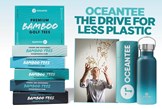 OceanTee wants to reduce every golfer's impact on the environment and make the game more sustainable.
OceanTee wants to reduce every golfer's impact on the environment and make the game more sustainable.
-
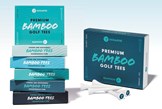 OceanTee's award-winning bamboo golf tees.
OceanTee's award-winning bamboo golf tees.
-
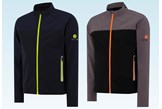 The OceanTee Beluga Jacket.
The OceanTee Beluga Jacket.
-
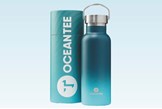 The OceanTee Drinks Bottle.
The OceanTee Drinks Bottle.
-
 OceanTee founder Ed Sandison.
OceanTee founder Ed Sandison.
-
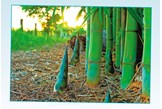 OceanTee tees are created from bamboo.
OceanTee tees are created from bamboo.
-
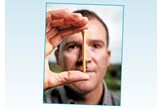 OceanTee founder Ed Sandison.
OceanTee founder Ed Sandison.
-
 OceanTee founder Ed Sandison.
OceanTee founder Ed Sandison.
-
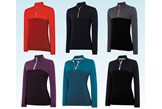 The OceanTee Manta Mid-Layer.
The OceanTee Manta Mid-Layer.
-
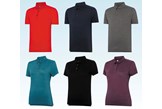 The OceanTee Reef polo shirt.
The OceanTee Reef polo shirt.
